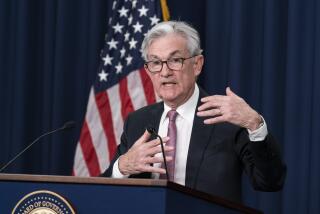NEWS ANALYSIS : German Central Bank’s Chief to Stay the Course
BERLIN — The German Cabinet approval Wednesday of hard-line monetarist Helmut Schlesinger as president of the Federal Bundesbank signals continuity of Germany’s strict interest rates policy.
Schlesinger, who has served as vice president to outgoing Bundesbank President Karl Otto Poehl since 1980, will be formally appointed to a two-year term by President Richard von Weizsaecker starting Aug. 1.
Hans Tietmeyer, 59, the man chiefly responsible for planning last year’s German monetary union, was approved by the Cabinet as the vice presidential nominee and is expected to take over as president when Schlesinger, 66, retires in 1993.
While both men stand for a continuation of the Bundesbank’s unbending primacy of price stability and strict monetary controls, Schlesinger is seen by many as the personification of this strategy.
“In an (economic) climate full of uncertainty, his appointment is a clear signal,” said Heidemarie Sherman, a monetary affairs specialist at the Ifo-Institute for Economic Research in Munich. “We know what he stands for. He’s known for being uncompromising.”
She described Schlesinger as “the brains” behind the Bundesbank’s tight monetary policy, saying, “Poehl sold the policy, but the brain behind it was Schlesinger.”
Frequently criticized abroad for failing to accept the role of economic locomotive, Germany has stuck to its tight monetary policies because they have paid off at home, yielding decades of steady growth with low inflation.
While similar in their policy views, Schlesinger and Poehl differ in style.
Poehl’s personable, outgoing manner, his enjoyment of the limelight and the finer things in life--he is said to make few international trips without his golf clubs--contrasts sharply with the more introverted, technocratic approach taken by Schlesinger.
Schlesinger’s appointment in some ways is seen as a belated reward for a career in central banking that spans 39 years. A Bavarian by birth, he worked briefly at the Ifo-Institute for Economic Research in Munich before joining the staff of the Bank for the German States, the Bundesbank’s predecessor, in 1952. He joined the Bundesbank’s governing board in 1972 and became vice president in January, 1980.
His appointment is likely to preclude any reversal of Germany’s resistance to lower interest rates as a strategy to revive flagging Western economies, many of which have slipped into recession. Last month, President Bush urged the Germans to consider lowering interest rates to spur growth, but his efforts drew no positive response.
In an interview last week, Schlesinger appeared to rule out any move by Germany to follow recent interest rate cuts taken by some other leading industrial nations. Instead, he stated only that the cuts by others might ease pressure to further increase interest rates in Germany.
Observers predicted that Schlesinger’s appointment would likely increase tensions within the European Monetary System, where the weaker currency nations have chafed at the hardships imposed by keeping abreast of a strong deutschemark and its relatively high interest rates. French politicians have recently complained that high German interest rates are accelerating France’s slide into recession because of the need to keep franc interest rates high.
Bundesbank officials respond, however, that German unification has provided a powerful locomotive for other European economies with its demands for imports.
Earlier this week, France reported its first monthly trade surplus with Germany in several years.
The timing of Schlesinger’s appointment means that Poehl will leave the bank three months earlier than the October date mentioned in his resignation news conference earlier this month. Although Poehl said he quit for personal reasons, he is known to have had several policy differences with Chancellor Helmut Kohl on monetary issues related to German unification.
More to Read
Sign up for Essential California
The most important California stories and recommendations in your inbox every morning.
You may occasionally receive promotional content from the Los Angeles Times.










